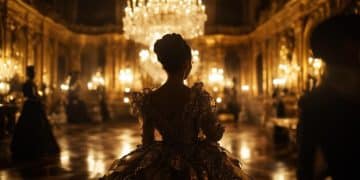From Page to Screen: Challenges in Adapting Historical Novels (2025)

Adapting historical novels into period piece dramas in 2025 presents numerous challenges, including maintaining historical accuracy, captivating modern audiences, securing funding, and navigating complex moral ambiguities within historical contexts.
The allure of bringing beloved historical novels to the screen is undeniable, yet the journey from page to screen is fraught with challenges, especially when dealing with the nuances of period piece dramas. Exploring From Page to Screen: The Challenges of Adapting Historical Novels into Period Piece Dramas in 2025 reveals a complex landscape of creative and logistical hurdles.
Navigating Historical Accuracy in 2025
Ensuring historical accuracy remains a paramount concern when adapting historical novels for the screen. In 2025, with audiences more discerning and vocal than ever, even minor inaccuracies can draw significant criticism.
The Pressure of Authenticity
The demand for authenticity places immense pressure on production teams. Recreating specific time periods requires meticulous research and attention to detail, from costumes and set designs to language and social customs.
Consulting Historical Experts
To mitigate the risk of inaccuracies, many productions now consult with historical experts. These consultants provide invaluable insights into the period, helping to ensure that the adaptation remains true to the source material.
- Costumes: Ensure all clothing and accessories reflect the time period accurately.
- Set Design: Recreate environments that mirror the historical setting.
- Language: Use dialogue that is appropriate to the language and social norms of the era.
- Social Customs: Portray social interactions in a manner that is consistent with historical accounts.
Ultimately, successfully navigating historical accuracy requires a dedicated commitment to research and a willingness to collaborate with experts. The goal is to create a world that feels authentic and immersive, allowing viewers to fully engage with the story.
Balancing Novel Fidelity with Cinematic Appeal
Adapting a historical novel requires a delicate balance between staying true to the source material and creating a visually compelling cinematic experience. Not every element that works on the page translates effectively to the screen.

Adapting Narrative Structure
Novels often have complex narrative structures that don’t easily translate to film or television. Screenwriters face the challenge of streamlining the plot while preserving the essence of the story.
Character Development and Nuance
Another challenge is conveying the depth and nuance of characters within the constraints of a visual medium. Internal monologues and descriptive passages must be transformed into visual cues and dialogue.
Successfully balancing novel fidelity with cinematic appeal often involves making difficult choices, such as:
- Streamlining the plot: Prioritizing key plot points and condensing secondary storylines.
- Visual storytelling: Using visuals to convey information that is presented through narration in the novel.
- Character arcs: Emphasizing character development through actions and interactions rather than internal thoughts.
By carefully considering these factors, filmmakers can create an adaptation that honors the spirit of the original novel while engaging a wider audience.
Securing Funding for Period Piece Dramas
Securing funding for period piece dramas can be a significant hurdle. These productions often require larger budgets due to the need for elaborate sets, costumes, and historical research.
The Perceived Risk Factor
Investors may perceive period piece dramas as a higher risk compared to contemporary stories. The cost of production, combined with the potential for limited audience appeal, can make securing funding difficult.
Attracting Investors and Studios
To attract investors and studios, producers must demonstrate the potential for commercial success. This can involve highlighting the popularity of the source material, showcasing the talent involved, and emphasizing the unique appeal of the story.
- Source Material Popularity: Emphasize the existing fanbase and critical acclaim of the source novel.
- Talent Acquisition: Secure well-known actors and directors to increase the project’s visibility.
- Unique Selling Points: Highlight what makes the story unique and appealing to a broad audience.
Overcoming the funding challenge requires a compelling pitch, a strong track record, and a clear vision for the project’s commercial viability. Demonstrating the potential for a return on investment is crucial for securing the necessary financial backing.
Catering to Modern Sensibilities While Respecting History
One of the most delicate aspects of adapting historical novels is catering to modern sensibilities while respecting the historical context. Audiences in 2025 have different expectations and values compared to previous generations.

Addressing Sensitive Topics
Many historical novels deal with sensitive topics such as slavery, colonialism, and gender inequality. Adapting these stories requires a nuanced approach that acknowledges the historical context while addressing modern concerns.
Representational Diversity
Audiences increasingly demand greater diversity and inclusion in media. Filmmakers must consider how to represent diverse characters and perspectives in a way that is both authentic and respectful.
Adapting historical novels for modern audiences requires careful consideration of:
- Historical Sensitivity: Addressing difficult topics with nuance and respect.
- Diversity and Inclusion: Ensuring that diverse characters and perspectives are represented authentically.
- Moral Ambiguity: Exploring the complexities of historical events without imposing modern moral judgments.
By balancing historical accuracy with modern sensibilities, filmmakers can create adaptations that are both informative and engaging for contemporary viewers.
The Role of Technology in Recreating the Past
Technology plays an increasingly important role in recreating the past for period piece dramas. From CGI and visual effects to advanced sound design, technology can enhance the authenticity and immersive quality of these productions.
Visual Effects and CGI
Visual effects and CGI can be used to recreate historical settings that no longer exist, or to enhance existing locations with period-appropriate details. These technologies can bring authenticity to the screen.
Sound Design and Atmospheric Effects
Authentic sound design and atmospheric effects can enhance the viewers’ experience. Recreating the sounds of daily life in a particular historical period can transport audiences.
Technological advancements offer many opportunities to create immersive films:
- Detailed Recreations: CGI allows filmmakers to accurately portray historical environments.
- Immersive Sound: Sophisticated sound design can create a more authentic and immersive auditory experience.
- Costume Design: Digital tools can aid in the creation and modification of period-accurate costumes.
By harnessing the power of technology, filmmakers can create period piece dramas that are more visually stunning and historically accurate than ever before.
Ethical Considerations in Historical Adaptations
Adapting historical novels raises important ethical considerations. Filmmakers must grapple with issues such as historical revisionism, cultural appropriation, and the potential for perpetuating harmful stereotypes.
Avoiding Historical Revisionism
It is crucial to avoid historical revisionism that distorts or diminishes the experiences of marginalized groups. Accuracy and authenticity should always be prioritized.
Cultural Appropriation and Sensitivity
Filmmakers must be mindful of cultural appropriation and ensure that they are portraying diverse cultures with respect and sensitivity. Consultation with cultural experts can improve adaptations and avoid misrepresentation.
To approach historical adaptations ethically, filmmakers should consider:
- Accuracy: Striving for historical accuracy and avoiding distortions of the past.
- Respect: Representing diverse cultures and perspectives with sensitivity and respect.
- Dialogue: Engaging in open dialogue with historians, cultural experts, and community members to inform the adaptation process.
By acknowledging and addressing these ethical considerations, filmmakers can create historical adaptations that are both engaging and responsible.
| Key Point | Brief Description |
|---|---|
| 📜 Historical Accuracy | Maintaining authenticity is key to engaging audiences. |
| 💰 Funding Challenges | Period dramas often require large budgets, making funding difficult. |
| 🎭 Modern Sensibilities | Balancing historical context with contemporary values is essential. |
| 🎬 Technology’s Role | Technology enhances the authenticity and immersive quality of dramas. |
Frequently Asked Questions
▼
The biggest challenge often lies in maintaining historical accuracy while making the story appealing and accessible to modern audiences. This requires careful research and creative storytelling.
▼
Casting is crucial, as actors must embody the essence of their characters and convincingly portray individuals from a different era. Their performances can make or break the adaptation.
▼
Costumes are vital in creating an authentic visual experience. They help transport viewers to the historical period and provide insight into the characters’ social status and personalities.
▼
Technology has revolutionized historical dramas by enabling filmmakers to recreate detailed historical settings, enhance visual effects, and improve sound design, making the experience more immersive.
▼
Ethical considerations include avoiding historical revisionism, respecting diverse cultures, and being sensitive to potentially offensive elements within historical contexts, which must be handled carefully.
Conclusion
Adapting historical novels into period piece dramas in 2025 involves navigating a complex set of challenges, from maintaining historical accuracy and securing funding to catering to modern sensibilities. By carefully considering these factors, filmmakers can create adaptations that are both engaging and historically responsible, bringing beloved stories to life on the screen in new and meaningful ways.





